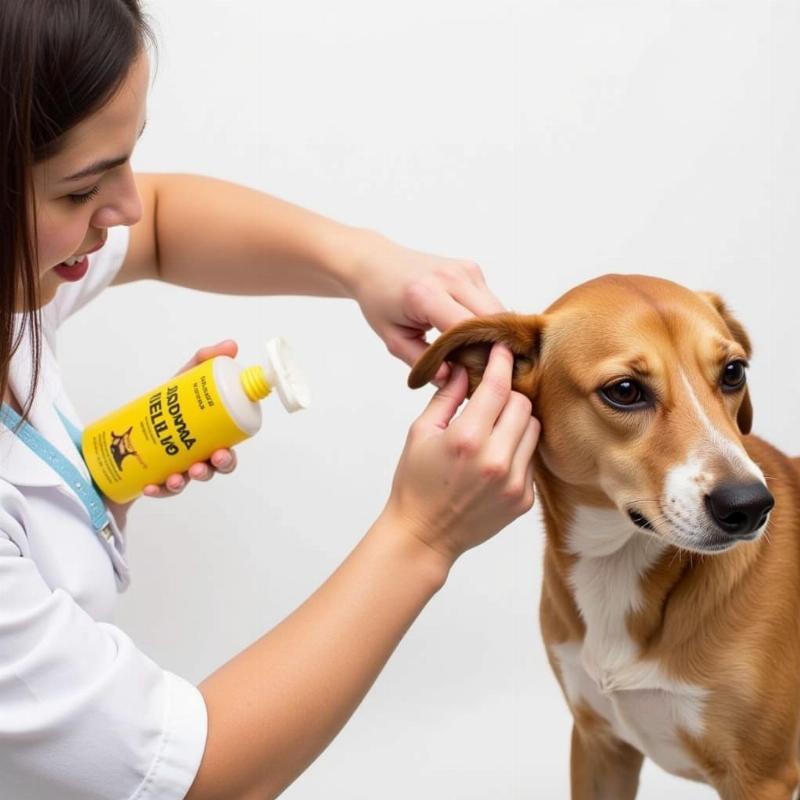Clotrimazole is a common antifungal medication used to treat various fungal infections in humans. But can clotrimazole be used on dogs? This is a common question among dog owners, and it’s important to understand the facts before applying any human medication to your furry friend. While clotrimazole can be effective against certain fungal infections in dogs, it’s crucial to consult with your veterinarian before using it.
Understanding Clotrimazole and Its Uses in Dogs
Clotrimazole works by disrupting the growth of fungi. In humans, it’s commonly used for conditions like athlete’s foot, ringworm, and yeast infections. While it can be effective for similar fungal infections in dogs, such as ringworm and yeast infections of the skin and ears, it’s essential to ensure proper dosage and application. Using the wrong concentration or applying it incorrectly can be ineffective or even harmful to your dog.
Veterinarian Guidance is Key Before Using Clotrimazole on Dogs
Never use human-grade clotrimazole on your dog without consulting your veterinarian. They can diagnose the specific fungal infection and prescribe the appropriate medication and dosage for your dog’s individual needs. Some dogs may have underlying health conditions that could be exacerbated by the use of clotrimazole. Additionally, your veterinarian can recommend the best formulation, whether it’s a cream, solution, or powder, and advise on the proper application method.
Risks and Side Effects of Clotrimazole in Dogs
While generally safe when used as directed by a veterinarian, clotrimazole can have some potential side effects in dogs. These can include redness, itching, or irritation at the application site. In rare cases, some dogs may experience more severe reactions. If you notice any unusual symptoms after applying clotrimazole, contact your veterinarian immediately.
Alternative Treatments for Fungal Infections in Dogs
Several other antifungal medications can be used to treat fungal infections in dogs. Your veterinarian can discuss these options with you and determine the best course of treatment based on your dog’s specific condition and health history. Some common alternatives include ketoconazole, miconazole, and terbinafine.
Preventing Fungal Infections in Dogs
Maintaining good hygiene for your dog can help prevent fungal infections. Regular bathing, keeping their ears clean and dry, and ensuring a clean living environment can significantly reduce the risk of fungal overgrowth.
 A dog owner cleaning their dog's ears at home.
A dog owner cleaning their dog's ears at home.
Conclusion: Consult Your Veterinarian Before Using Clotrimazole
While clotrimazole can be used on dogs for certain fungal infections, it’s crucial to seek veterinary advice first. Self-treating your dog with human medications can be risky and potentially harmful. Your veterinarian can diagnose the infection, prescribe the appropriate dosage and formulation, and monitor your dog for any adverse reactions. Prioritizing your dog’s health and well-being means seeking professional guidance before administering any medication, including clotrimazole.
FAQ
- Can I use over-the-counter clotrimazole cream on my dog? No, it’s best to consult your veterinarian before using any medication on your dog, even over-the-counter products.
- What are the signs of a fungal infection in dogs? Common signs include hair loss, itching, redness, and scaling of the skin.
- How long does it take for clotrimazole to work on dogs? The treatment duration varies depending on the severity of the infection, but it usually takes several weeks.
- Are there any home remedies for fungal infections in dogs? While some home remedies may provide temporary relief, it’s crucial to consult your veterinarian for proper diagnosis and treatment.
- Can fungal infections in dogs be contagious to humans? Yes, some fungal infections, like ringworm, can be transmitted between dogs and humans.
- How can I prevent my dog from getting fungal infections? Maintaining good hygiene, providing a healthy diet, and regular veterinary checkups can help prevent fungal infections.
- What should I do if my dog experiences side effects from clotrimazole? Contact your veterinarian immediately if you notice any adverse reactions after applying clotrimazole.
Connect with Beautdogs.us for Expert Pet Care Advice
Beautdogs.us is your premier online destination for comprehensive and reliable dog care information. We offer expert guidance on dog breeds, grooming, nutrition, and overall well-being. From puppy care to senior dog needs, we provide trusted resources for both new and experienced dog owners. Connect with us for personalized advice and discover the best products and services to enhance your dog’s life. Email: [email protected], Phone: +1 501-555-7529. Visit Beautdogs.us today!